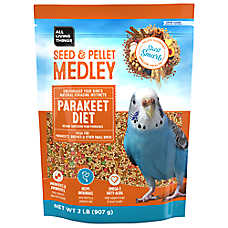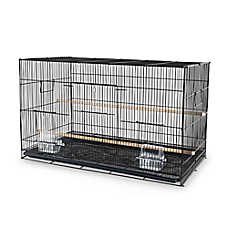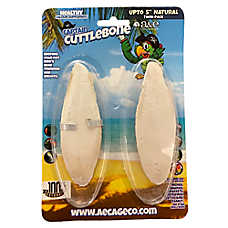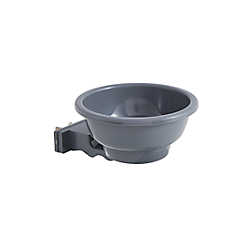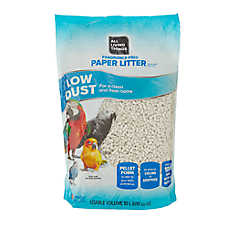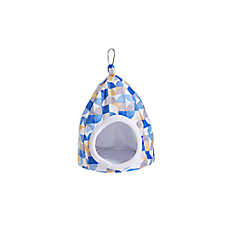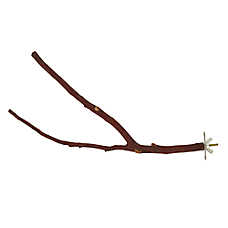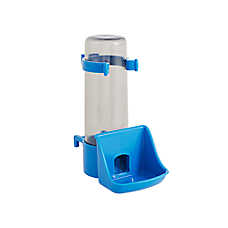Parakeet/Budgerigar Care Guide
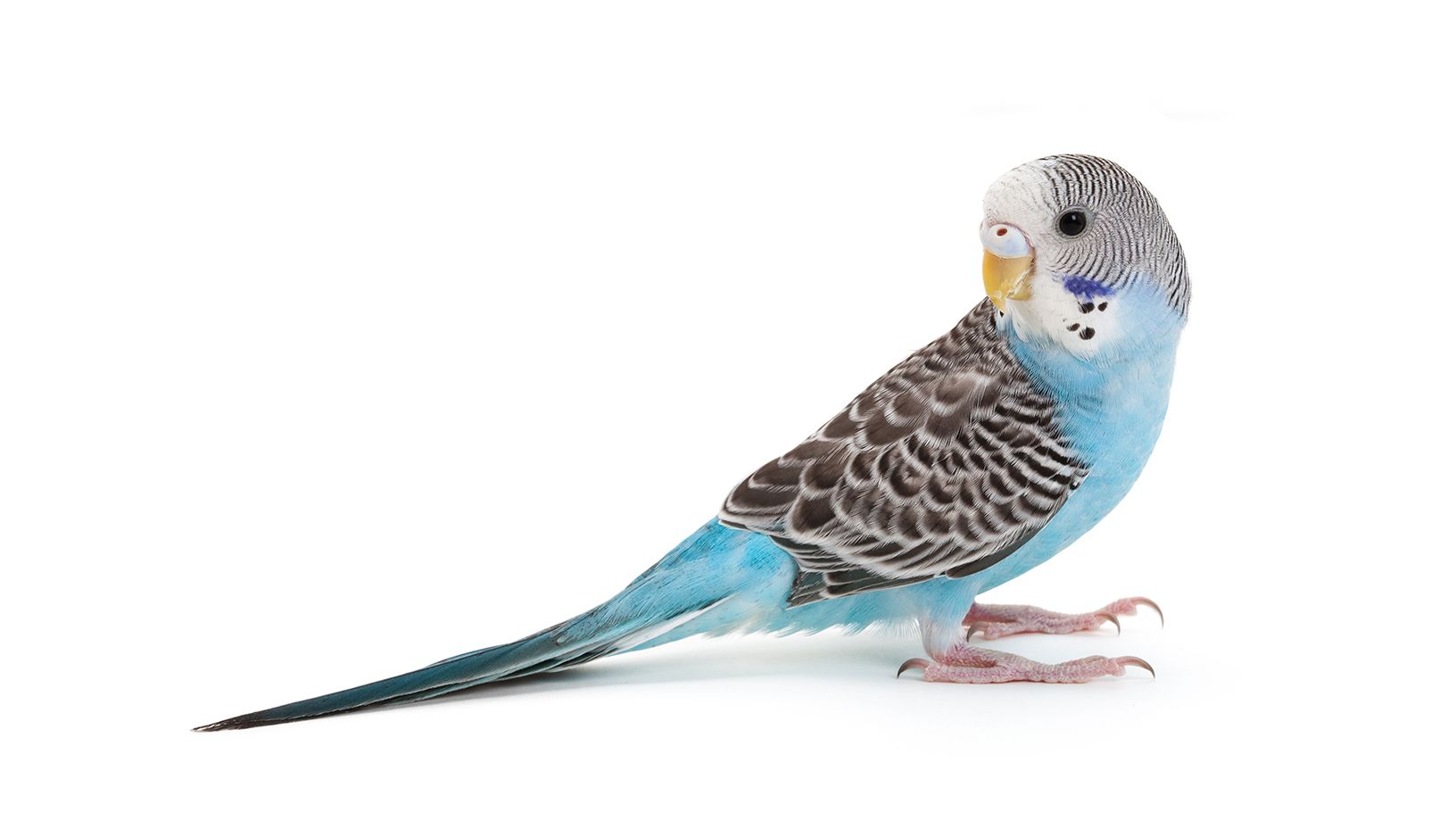
In this Article
Beautiful & Boisterous Budgies!
Commonly called “parakeets” or “budgies” for short, budgerigars are a species of bird native to Australia. In a surprise to many people, budgies are actually very small parrots! Just like their larger cousins, these birds are full of personality. They tend to be affectionate, build relationships with their owners, and can learn to mimic human speech and other sounds!
Parakeet Species profile
Size: Parakeets grow up to 7" (18 cm) from head to end of tail.
Lifespan: On average, parakeets live for 7 to 10 years.
Temperament: Parakeets are social, curious, and are so smart they can even learn tricks and commands like “step up” and their own name. A parakeet whose needs are met is generally easy to handle and full of personality.
Behavior: Parakeets are social animals and thrive living in same-gender pairs and groups. In addition to social interaction between birds, your parakeet needs at least 30min every day of one-on-one bonding with you too!
Setting up your parakeet habitat
Parakeets need a clean, enriching, and safe space with plenty of room to stretch, fly, and play.
Enclosure size and placement
- Minimum size: 18” x 18” x 24”
- Recommended size 20”x 20” x 30” or larger if you have the space
- Bigger is better, especially for multiple birds
- Keep the enclosure at or below eye level
- Place away from:
- Kitchens and cooking fumes (especially non-stick cookware)
- Drafts, strong odors, or direct sunlight
- Cover the enclosure at night to help your bird feel secure
Enrichment and accessories
- Provide at least three toys and rotate them regularly
- Include puzzles, chewable toys, and foraging items to encourage natural behavior
- Add a T-stand or indoor playpen for out-of-cage time
- Use a cage liner and replace as needed to keep the enclosure clean
Bathing and water
- Offer a birdbath or shallow dish for splashing
- Mist gently with warm water 2–3 times a week
Parakeet care and feeding
A balanced diet and access to clean water are essential for your parakeet’s health and happiness.
Daily diet:
- Pellet-seed blend: This should be your bird’s main source of nutrition.
- Keep the bowl about three-quarters full
- Remove old food and refill with fresh daily
- Fresh vegetables, fruits, and grains:
- Offer every other day
- Leafy greens are especially healthy and help keep your bird’s diet varied
Treats and extras:
- Offer honey sticks or millet spray no more than once or twice a month
- Use treats in small quantities to avoid obesity
Water:
- Provide clean, fresh water at all times
- Use a bowl or bird water bottle, whichever your parakeet prefers
Never feed your bird chocolate, sugar, fried foods, avocado, or human junk food. These foods can make your bird very sick.
[When to see a vet]
In addition to regularly scheduled appointments, contact your avian veterinarian if you notice the following signs:
- long periods sitting at the bottom of the enclosure
- decreased appetite or weight loss
- less activity and grooming
- feathers fluffed for long periods of time
- sneezing; discharge from eyes, nose or mouth
- runny droppings for more than two days
- constantly plucking feathers or feathers are falling out
- beak over gown/ not closing normally
Go to “find a vet” on AAV.org for help finding an avian veterinarian in your area.
SHOPPING CHECKLIST
- Cage habitat
- Minimum size 18”x 18” x 24"
- Recommended size 20”x 20” x 30” or larger
- fortified parakeet pellet diet
- seeds, fruits and veggies can be used in addition for treats or enrichment to chew on
- food bowls
- water bottle and/or bowl
- at least two perches (each a different thickness and height)
- A misting spray bottle and/or bird bath (for bathing)
- Ladder perch (additional to 2 other perches)
- toys
- habitat liner
- habitat cover (for nighttime)
- cuttlebone
Ready to learn more? This guide is a great starting place, but we encourage you to do more research on the individual species that you are keeping so that you can be as successful as possible!
FAQs
How long do parakeets live?
Most parakeets live between 7 to 10 years with proper care, including a healthy diet, clean environment, and regular social interaction.
Most parakeets live between 7 to 10 years with proper care, including a healthy diet, clean environment, and regular social interaction.
Can parakeets talk?
Some parakeets, especially males, can mimic words, sounds, or whistles. Not all will talk, but with daily interaction, many learn to repeat simple phrases or tunes.
Some parakeets, especially males, can mimic words, sounds, or whistles. Not all will talk, but with daily interaction, many learn to repeat simple phrases or tunes.
What should I feed my parakeet?
Parakeets thrive on a pellet-seed blend as their main diet, with leafy greens, fruits, and grains added a few times a week. Avoid chocolate, avocado, and junk food.
Parakeets thrive on a pellet-seed blend as their main diet, with leafy greens, fruits, and grains added a few times a week. Avoid chocolate, avocado, and junk food.
Do parakeets need a companion?
Parakeets are social birds and often do best in same-gender pairs or groups. A single bird can be happy too, but only if you spend time interacting with them every day.
Parakeets are social birds and often do best in same-gender pairs or groups. A single bird can be happy too, but only if you spend time interacting with them every day.
How big should a parakeet cage be?
At minimum, the enclosure should be 18 x 18 x 24 inches. If you have space, a larger habitat is always better, especially for more than one bird.
At minimum, the enclosure should be 18 x 18 x 24 inches. If you have space, a larger habitat is always better, especially for more than one bird.
How do I keep my parakeet healthy?
Clean the cage regularly, offer fresh food and water daily, and watch for signs of illness such as fluffed feathers, lethargy, or reduced appetite. Routine vet checkups are also recommended.
Clean the cage regularly, offer fresh food and water daily, and watch for signs of illness such as fluffed feathers, lethargy, or reduced appetite. Routine vet checkups are also recommended.
Why is my parakeet chirping so much?
Parakeets chirp to communicate, express happiness, or respond to their environment. Frequent chirping is usually normal, but if it’s excessive or paired with stress signs, check for boredom or changes in routine.
Parakeets chirp to communicate, express happiness, or respond to their environment. Frequent chirping is usually normal, but if it’s excessive or paired with stress signs, check for boredom or changes in routine.
